Sometimes the equations are complex and you will find it difficult to assume values for the variables. Example –
Q . 1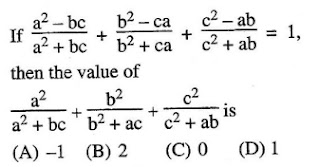
Although the equation is symmetrical, we can’t assume a=b=c, because that will make the LHS = 0. Such situations specially arise when the RHS is non-zero (here it is 1). Now what should we do? The trick is simple, there are three terms on the LHS, hence assume each term to be 1/3 (so that all the three terms will add up to give 1). Why have we taken 1/3, although it is obvious but still it comes from the formula – (value on RHS) / (No. of terms on LHS)
Here RHS = 1 and No. of terms on LHS = 3, hence we have assumed the value of each term as 1/3.
(a2 – bc)/(a2 + bc) = 1/3 … (1)
(b2 – ca)/(b2 + ca) = 1/3 … (2)
(b2 – ca)/(b2 – ca) = 1/3 … (3)
From (1), we get a2 = 2bc … (4)
. Similarly from (2) and (3), we get b2 = 2ca … (5)
and c2 = 2ab … (6)
Put the values of a2, b2 and c2 from (4), (5) and (6) in the expression whose value we have to find…
You will get 2 as the answer
Answer : (B)
- 2
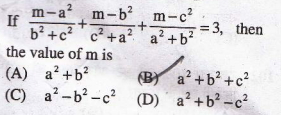
Here again, value on RHS = 3, No of terms = 3. Hence we assume each term to be 3/3 = 1
Therefore, (m – a2)/(b2 + c2) = 1
or m = a2 + b2 + c2
Answer : (B)
Please note that this hack is also applicable only for symmetrical equations.
Now let us see some other questions where you can assume the values.
- 3
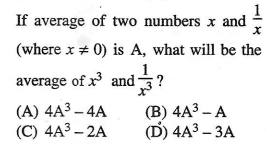
Put x = 1, then since A is the average of x and 1/x, it’s value will also be A = 1
The average of x3 and 1/ x3 = 1
Put A = 1 in all the 4 options to check which option will give ‘1’ as the output.
Answer : (D)
Q . 4
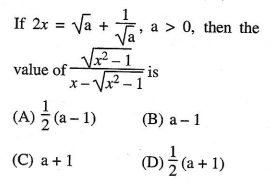
Here on putting a=1, you will find that both the options A and B will give the same result. Hence put a = 4, then x = 1.25
The value of the expression = 3/2
Answer : (A)
Here, I have straight away put a=4, instead of 2 or 3 because in the question we have to calculate the square root of a. So if you will take a perfect square(like 4), the calculations will be much easier.
Note : In this question we calculated the square of 1.25, which is 1.5625. For those who don’t know the trick for calculating the square of numbers ending with ‘5’ (like 15, 65, 135, 225, etc.), let me share it.
In such cases, the last two digits are always 25.
E.g. the square of 65
The last two digits = 25
First 2 digits = 6*(6+1) = 42
Hence square of 65 = 4225
Similarly square of 125
The last two digits = 25
First 3 digits = 12*(12+1) = 156
Square of 125 = 15625
- 5.
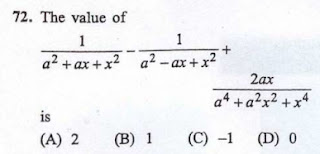
Put x = 0
1st term = 1/a^2
2nd term = 1/a^2
3rd term = 0
1st term – 2nd term + 3rd term = 0
Answer : (D)
You can choose any value for ‘x’ and you would get the same answer. For e.g. let us take x = 1
= 1/(a^2 + a + 1) – 1/(a^2 – a + 1) + 2a/(a^4 + a^2 + 1)
= -2a/(a^4 + a^2 + 1) + 2a/(a^4 + a^2 + 1)
= 0
If you have any doubt in any question that has been asked by SSC, please drop a comment.













